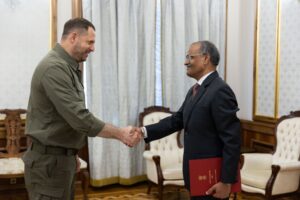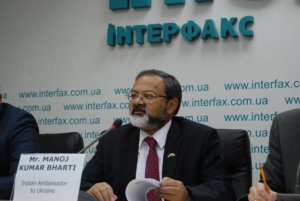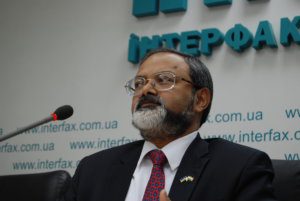
Head of the Office of the President Andriy Yermak met with Ambassador of India to Ukraine Harsh Kumar Jain to discuss deepening of bilateral cooperation, the press service of the Ukrainian head of state reported.
In addition, during the meeting the parties exchanged views on the eve of important international events, in particular in the context of the opening of the new session of the UN General Assembly.
In turn, the head of the OP thanked India for participation in consultations on the implementation of the Formula of peace of the President of Ukraine.
“It is very important for us to support this open dialog, to know the opinions and understand the position of all our friends and partners,” – quotes Yermak press service.
Source: https://president.gov.ua/news/andrij-yermak-obgovoriv-iz-poslom-indiyi-podalshu-robotu-v-m-85329

Trade between Ukraine and India in 2017 grew by 18.8%, reaching $2.8 billion, Indian Ambassador to Ukraine Mr. Kumar Bharti Manoj said at a press conference at Interfax-Ukraine on Tuesday. “Here two important moments should be pointed out. India became the fifth country in the volume of the export from Ukraine abroad. In addition, India is the second country with which Ukraine has the surplus in trade. Only Ukraine and Egypt have bigger surplus in trade – $1.75 billion, while between Ukraine and India it is $1.65 billion,” he said.
The ambassador said that these indicators fuel confidence that the growth of trade turnover in 2018-2019 could be 20% and 25%, respectively.
Commenting on trade relations between the countries, he said that India was the first country in terms of export of Ukrainian sunflower oil. Last year India exported $2 billion worth of oil. In addition, in 2017, for the first time, a lot of beans were exported from Ukraine to India. “Another very important factor is that the largest share of the total number of foreign students in Ukraine last year was made up of Indian students, a figure we reached for the first time in 15 years,” the Indian diplomat said.
So, according to him, today more than 10,800 Indian students are studying in Ukraine, which is 80% more than in 2015.
“I am pleased to say that in almost two years we have increased the number of Indian students from 6,000 to almost 11,000. Taking into account the fact that each Indian student spends about $5,000 a year for education, living and personal expenses, Ukraine already earns $55 million only through the provision of education to Indian students,” he said. The ambassador said that India plans to increase the number of its citizens studying in Ukrainian universities to 40,000 in the coming years, which in turn will give Ukraine about $200 million a year.
He also said that the inclusion of India in the list of countries, which citizens receive the Ukrainian visa upon their arrival to the airport, had a positive impact on the tourist flow. The number of Indian citizens, who visited Ukraine last year, increased more than 50%, to 29,400 people.
The ambassador said that one of the leading sectors where Ukraine could expect investment from India is pharmaceutical production.
President of the Indian Pharmaceutical Manufacturers’ Association (IPMA) Dr. Ramanan Unni Parambath Menon pointed out the growth of the pharmaceutical market in Ukraine in 2017 and positive changes in the regulatory field in this sphere.
“We see positive steps from regulators, in particular, changes are made to regulations and resolutions, among which there are a lot of democratic norms,” he said.
Head of the Representative Office of Dia Pharma Limited Ukraine Mr. Pandian Thamarai said that at the present, preparations made in India occupy in kind 3% of the Ukrainian pharmaceutical market, in money terms – 4.5%. “There is a great potential for Indian pharmaceutical manufacturers,” he said.
At the same time, representative of EuroLifeCare Sanjeev Bhagat said that for the growth of the volume of Indian medicines on the Ukrainian market, transparent legal regulations, as well as transitional periods in implementing changes, are required to enable manufacturers to properly prepare for the new standards. The IPMA (the Indian Pharmaceutical Manufacturers’ Association) brings together Indian pharmaceutical manufacturing companies that meet high international standards, including US FDA (the United States), UK MHRA (Britain), MCC (South Africa), TGA (Australia), WHO GMP (WHO), GMP (Ukraine), which have representative offices in Ukraine.

India hopes that Ukraine will adopt Ayurveda as alternative medicine, Indian Ambassador to Ukraine Manoj Kumar Bharti has said. “This year we added one more goal in relationship between Ukraine and India – cooperation in the field of Ayurveda, in the field of Ayurvedic practices and Ayurvedic medicine,” he said at a press conference at Interfax-Ukraine on Tuesday.
According to him, a delegation of the Confederation of Indian Industry (CII) will arrive in Ukraine in April to inform the government of the need to develop a policy for the adoption of Ayurveda as alternative medicine.
In addition, as part of this initiative, the ambassador noted the need to resolve the issue of importing Ayurvedic products into Ukraine as medical products, rather than biologically active additives.
There are currently 12 manufacturers of Ayurvedic products in India that meet the standards of Good Manufacturing Practice (GMP). According to Manoj Kumar Bharti, Ayurvedic medicine will help reduce the cost of treatment in Ukraine.
“The result of the popularization of Ayurveda in Ukraine will be saving on treatment. People will receive good Ayurvedic medical treatment for a very reasonable cost,” he said. “At the same time, the government of Ukraine, in particular, the Ministry of Health and the Ministry of Education, should be aware of the need to teach Ayurveda in medical universities and universities of alternative medicine so that Ayurvedic practitioners are also brought up in Ukraine,” he said.
In addition, the ambassador stressed that Ayurvedic medicine is recognized by several European countries, as well as by the World Health Organization (WHO) as an alternative to traditional medicine. “Speaking about Europe, I’m not talking about the rest of the world and about Asia. Hungary, Switzerland and Germany also officially adopted Ayurveda as alternative medicine,” he said.
As reported, India intends to support the development and promotion of traditional Indian medicine around the world.